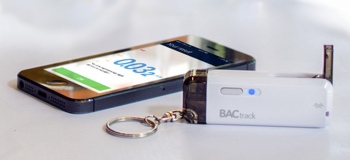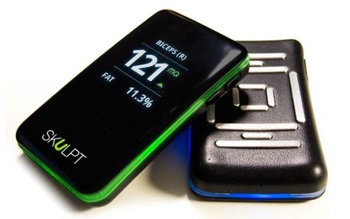Monitor your heart rate
 Some newer smartphones, such as the Samsung Galaxy S® 6,
have integrated heart rate monitors. But there are also apps that work
with a number of smartphones that allow you to measure your heart rate.
That includes Instant Heart Rate and Runtastic Heart Rate (both available for Android and iOS)—which can take your workout to the next level.
Some newer smartphones, such as the Samsung Galaxy S® 6,
have integrated heart rate monitors. But there are also apps that work
with a number of smartphones that allow you to measure your heart rate.
That includes Instant Heart Rate and Runtastic Heart Rate (both available for Android and iOS)—which can take your workout to the next level.I use my smartphone every day, often in the first few minutes I wake up. It’s not because I’m addicted (ok, maybe I am a little bit addicted) – it’s because my phone is so darn useful. It tells me the weather. It helps me avoid and navigate around traffic jams. It helps me keep in touch with my friends.
Prevent drunk driving
 Imagine you’re at a house party with a couple close friends. You’ve
all shared a glass or two of wine. You feel like you’re probably OK to
drive, but it’d be far more responsible to know for sure.
Imagine you’re at a house party with a couple close friends. You’ve
all shared a glass or two of wine. You feel like you’re probably OK to
drive, but it’d be far more responsible to know for sure.That’s where the new Bluetooth BACtrack Vio Smartphone Breathlyzer comes in. The compact keychain device measures the alcohol present on your breath in just 5 seconds, wirelessly sending your BAC reading to your iOS or Android smartphone. An included app will predict how long it’ll take for your levels to return to 0%, helping you plan whether to call a cab or just “wait it out.”
The BACtrack Vio is available directly from BACtrack and at Amazon.com for just $49.99.
Measure your muscles
 As any health expert will tell you, your bathroom scale isn’t the
best way to measure progress at the gym. Muscle weighs more than fat, so
gaining the occasional pound or two can be a very good thing.
As any health expert will tell you, your bathroom scale isn’t the
best way to measure progress at the gym. Muscle weighs more than fat, so
gaining the occasional pound or two can be a very good thing.The Skulpt Aim helps you get a better handle on your fitness by tracking your body fat percentage and the muscle fiber size instead of your weight. It uses small electrodes to measure individual muscle groups and areas and relays the info to your phone, giving you an overall picture of where you’re making progress and where you’re not. The device even comes with an app that recommends exercises that are best for your body’s unique composition.
The Skulpt Aim works with both Android and iOS device and is expect to start shipping in Fall 2014. You can preorder yours at skulpt.me for $169.99, which includes free shipping.
Test for STDs
 This smartphone dongle or attachment performs the functions of a lab-based blood test—specifically,
an enzyme-linked immunosorbent assay (ELISA)—to test for HIV antibodies
and two types of syphilis antibodies. Researchers recently tested it in
Rwanda in clinics that work to prevent mother-to-child-transmission and
in voluntary counseling and testing centers. With an estimated
manufacturing cost of $34 versus the $18,450 typical for ELISA
equipment, this device could advance early diagnosis and treatment of
these illnesses in developing countries.
This smartphone dongle or attachment performs the functions of a lab-based blood test—specifically,
an enzyme-linked immunosorbent assay (ELISA)—to test for HIV antibodies
and two types of syphilis antibodies. Researchers recently tested it in
Rwanda in clinics that work to prevent mother-to-child-transmission and
in voluntary counseling and testing centers. With an estimated
manufacturing cost of $34 versus the $18,450 typical for ELISA
equipment, this device could advance early diagnosis and treatment of
these illnesses in developing countries.Give you an instant eyeglass prescription
 Smart Vision Labs
created the SVOne, a pocket-sized device that measures refractive
errors in the eye and displays a digital eyeglass prescription via smart
phone. The company founders envision it for use by doctors with
multiple offices or limited space and to serve patients who struggle
with traditional machinery or have difficulties with mobility. Where it
could really shine, though, is in developing countries where millions
lack eye care. The World Health Organization
reports that some 90 percent of the world’s visually impaired people
live in low-income settings with no eye doctors available and that
uncorrected refractive errors are the main cause of moderate and severe
visual impairment globally.
Smart Vision Labs
created the SVOne, a pocket-sized device that measures refractive
errors in the eye and displays a digital eyeglass prescription via smart
phone. The company founders envision it for use by doctors with
multiple offices or limited space and to serve patients who struggle
with traditional machinery or have difficulties with mobility. Where it
could really shine, though, is in developing countries where millions
lack eye care. The World Health Organization
reports that some 90 percent of the world’s visually impaired people
live in low-income settings with no eye doctors available and that
uncorrected refractive errors are the main cause of moderate and severe
visual impairment globally.Track your cholesterol
 Engineers at Cornell University created the Smartphone Cholesterol Application for Rapid Diagnostics, or smartCARD,
to test cholesterol levels. Users clamp the device, similar to a credit
card reader, over the phone's camera then place a drop of blood, sweat
or saliva on a test strip. Insert the strip into the device and voila,
a built-in flash illuminates the strip and an app matches the image's
color values and shows results on the phone. Currently, the test
measures total cholesterol, but the lab is working on measuring LDL
("bad" cholesterol), HDL ("good" cholesterol) and triglycerides, as well
as vitamin D levels. This app might make you re-think that double
cheeseburger, eventually.
Engineers at Cornell University created the Smartphone Cholesterol Application for Rapid Diagnostics, or smartCARD,
to test cholesterol levels. Users clamp the device, similar to a credit
card reader, over the phone's camera then place a drop of blood, sweat
or saliva on a test strip. Insert the strip into the device and voila,
a built-in flash illuminates the strip and an app matches the image's
color values and shows results on the phone. Currently, the test
measures total cholesterol, but the lab is working on measuring LDL
("bad" cholesterol), HDL ("good" cholesterol) and triglycerides, as well
as vitamin D levels. This app might make you re-think that double
cheeseburger, eventually.Assess your mental health
 Dartmouth University researchers built an Android app that knows the smartphone owner’s state of mind.
The app automatically measures sleep duration, number and length of
conversations per day, physical activity, locations and time spent
there, stress level, eating habits and more—24/7 and without user
interaction. Computational method and machine learning algorithms on the
phone then assess that data and make higher-level inferences about
sleep, sociability, activity, and other behaviors. When 48 students
carried phones with the app during a 10-week term, the data
significantly correlated with their mental health and academic
performance. The app potentially could be used to provide real-time
feedback on campus safety and stress levels, identify students at risk,
and assess the quality of teaching. It could also be used to monitor
mental health, trigger intervention, and improve productivity in the
workplace as well.
Dartmouth University researchers built an Android app that knows the smartphone owner’s state of mind.
The app automatically measures sleep duration, number and length of
conversations per day, physical activity, locations and time spent
there, stress level, eating habits and more—24/7 and without user
interaction. Computational method and machine learning algorithms on the
phone then assess that data and make higher-level inferences about
sleep, sociability, activity, and other behaviors. When 48 students
carried phones with the app during a 10-week term, the data
significantly correlated with their mental health and academic
performance. The app potentially could be used to provide real-time
feedback on campus safety and stress levels, identify students at risk,
and assess the quality of teaching. It could also be used to monitor
mental health, trigger intervention, and improve productivity in the
workplace as well.Help keep you sober
 The Addiction-Comprehensive Health Enhancement Support System smartphone app,
designed for patients with alcohol use disorder, provides audio-guided
relaxation and sounds an alert if individuals stray near a high-risk
location, such as a bar they previously frequented. Patients leaving
residential treatment who used the app reported an average of 1.37 fewer
risky drinking days—meaning more than four standard drinks for men and
three for women in a two-hour period—than those not using the app.
Patients using the app also were more likely to consistently abstain
from alcohol.
The Addiction-Comprehensive Health Enhancement Support System smartphone app,
designed for patients with alcohol use disorder, provides audio-guided
relaxation and sounds an alert if individuals stray near a high-risk
location, such as a bar they previously frequented. Patients leaving
residential treatment who used the app reported an average of 1.37 fewer
risky drinking days—meaning more than four standard drinks for men and
three for women in a two-hour period—than those not using the app.
Patients using the app also were more likely to consistently abstain
from alcohol.Alert you that the milk is spoiled
 Researchers at MIT developed sensors
that can be read by a smartphone to detect ammonia, hydrogen peroxide,
cyclohexanone, and other gases. In the future, it could be used to
monitor public spaces for explosives and other harmful chemicals,
identify environmental pollutants, or detect food spoilage in
warehouses. The sensors also could be used in "smart packaging" that
detects spoilage or contamination in the foods you buy. Your next phone
message could be from that old milk carton in the refrigerator.
Researchers at MIT developed sensors
that can be read by a smartphone to detect ammonia, hydrogen peroxide,
cyclohexanone, and other gases. In the future, it could be used to
monitor public spaces for explosives and other harmful chemicals,
identify environmental pollutants, or detect food spoilage in
warehouses. The sensors also could be used in "smart packaging" that
detects spoilage or contamination in the foods you buy. Your next phone
message could be from that old milk carton in the refrigerator.Improve your hearing aid
 This smartphone app could help improve the quality of life of people who use hearing assistive devices,
including hearing aids, cochlear implants, and personal sound
amplifiers. To remain small and low-cost, these devices typically use
not-so-powerful processors. Smartphones, on the other hand, have
powerful processors, large memories, microphones, speakers, wireless
technology and long-lasting batteries, which can improve the performance
of hearing assistive devices. For example, a smartphone could run
sophisticated algorithms to distinguish background noise signals and
enhance speech.
This smartphone app could help improve the quality of life of people who use hearing assistive devices,
including hearing aids, cochlear implants, and personal sound
amplifiers. To remain small and low-cost, these devices typically use
not-so-powerful processors. Smartphones, on the other hand, have
powerful processors, large memories, microphones, speakers, wireless
technology and long-lasting batteries, which can improve the performance
of hearing assistive devices. For example, a smartphone could run
sophisticated algorithms to distinguish background noise signals and
enhance speech.
No comments:
Post a Comment